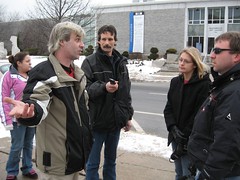Complaint made to competition bureau that VLTs use 'deceptive' technologies
Published: Monday, January 15, 2007 | 5:56 PM ET
Canadian Press: MICHAEL TUTTON
HALIFAX (CP) - Six people have launched a complaint before the federal Competition Bureau that electronic gaming machines are designed to entice gamblers into risking too much of their money.
The complaint alleges that by using "deceptive technologies," provincial gaming corporations are violating provisions of the Competition Act that prohibit deceptive marketing practices.
Debbie Langille, a Halifax resident and self-described gambling addict, claims that one example of an unfair trade practice is that software in the machines often produces near misses, enticing a gambler to try "just one more time."
"They give you that feeling that it's going to come, it's going to come. . . . They never, ever display the true odds of winning on the VLT," she said in an interview Monday.
The complaint submitted to the Competition Bureau, based in Gatineau, Que., says the machines give a "false or misleading" impression of the chances of winning.
Langille, a former fraud investigator with the federal government, said she is participating in the complaint because she lost all her life savings to the machines and wants to help prevent others from doing the same.
She said the group's ultimate goal is to force provincially owned gaming corporations to modify the machines to make them less enticing.
Roger Horbay, another complainant in the case, cites Australian studies that suggest VLTs are very similar to "cheating carnival games."
William Rutsey, the chief executive of the Canadian Gaming Association, which represents the major gaming operators and equipment manufacturers, said the allegations by complainants are "nonsense."
"I think they are failing to recognise the fact there are standards around the world," he said. "There are gaming regulators in Canada and the United States that test and approve all of these machines to determine the fairness of these games."
Rutsey said the "near misses" aren't deceptive.
"I don't understand that as a concept," he said. "The games are random events."
Margaret McGee, a spokeswoman for the Nova Scotia Gaming Corp., said her organization would have to examine what the complainants are alleging before submitting a formal response.
"We're committed to educating the public, and in all of our materials we make clear that these games are generated by random chance. . . . We make clear that there's no way to predict the outcome of a game," she said.
McGee noted that her organization publishes the odds of winning in pamphlets and on its website.
In Nova Scotia, the chances are one in 270,000 of winning a VLT game.
There is a cross section of people from across the country participating in the complaint.
David Bornman, a pastor in Vancouver; Christine McKay, an addiction therapist in Squamish, B.C.; Phyllis Vineberg, a homemaker in Montreal; Sol Boxenbaum, a consumer advocate in Montreal; Brian Yeallan, a chaplain in Kingston, Ont.; Bill Clark, a retired pharmacist and teacher from North Bay; and Johannes Deviet, an editor from London, Ont., are also named as complainants.

1 comment:
This would be good to keep an eye on and if these people do manage to succeed it will only be a short time before all other provinces will find themselves in the same situation but in New Brunswick you could probably tack on another charge of note even trying to negotciate in good faith with the voters of that province.
Post a Comment